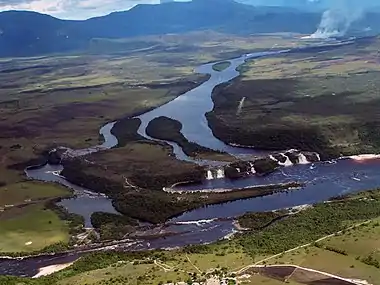Portal:Guyana
The Guyana Portal The flag of Guyana Guyana (/ɡaɪˈɑːnə/ ( The region known as "the Guianas" consists of the large shield landmass north of the Amazon River and east of the Orinoco River known as the "land of many waters". Nine indigenous tribes reside in Guyana: the Wai Wai, Macushi, Patamona, Lokono, Kalina, Wapishana, Pemon, Akawaio and Warao. Historically dominated by the Lokono and Kalina tribes, Guyana was colonised by the Dutch before coming under British control in the late 18th century. It was governed as British Guiana, with a mostly plantation-style economy until the 1950s. It gained independence in 1966, and officially became a republic within the Commonwealth of Nations in 1970. The legacy of British rule is reflected in the country's political administration and diverse population, which includes Indian, African, Indigenous, Chinese, Portuguese, other European, and various multiracial groups. In 2017, 41% of the population of Guyana lived below the poverty line. Guyana is the only South American nation in which English is the official language. However, the majority of the population speak Guyanese Creole, an English-based creole language, as a first language. Guyana is part of the Anglophone Caribbean. It is part of the mainland Caribbean region maintaining strong cultural, historical, and political ties with other Caribbean countries as well as serving as the headquarters for the Caribbean Community (CARICOM). In 2008, the country joined the Union of South American Nations as a founding member. Guyana's economy has been undergoing a transformation since the discovery of crude oil in 2015 and commercial drilling in 2019, being one of the only economies to grow despite the pandemic in 2020 at 49% GDP growth through the year, making it, by some accounts, currently the world's fastest-growing economy. Due to Guyana's small population and as much as 11 billion barrels in oil reserves, the country is on course to become one of the largest per capita oil producers in the world by 2030. The discovery of over 11 billion barrels of oil reserves off the coast of Guyana in the last five years is the largest addition to global oil reserves in the last 50 years. Guyana is now ranked as having the fourth-highest GDP per capita in the Americas after the United States, Canada, and The Bahamas, and has been one of the countries with the most improvement in Human Development Index ranking since 2015. (Full article...) Selected article -
Edmond Montague Grant (born 5 March 1948) is a Guyanese-British singer, songwriter and multi-instrumentalist, known for his genre-blending sound; his music has blended elements of pop, British rock, soul, funk, reggae, electronic music, African polyrhythms, and Latin music genres such as samba, among many others. In addition to this, he also helped to pioneer the genre of "Ringbang". He was a founding member of the Equals, one of the United Kingdom's first racially-mixed pop groups who are best remembered for their million-selling UK chart-topper, the Grant-penned "Baby, Come Back". His subsequent solo career included the 1982 song "I Don't Wanna Dance", plus the platinum 1983 single "Electric Avenue", which is his biggest international hit. He earned a Grammy Award nomination for the song. He is also well known for the anti-apartheid 1988 song, "Gimme Hope Jo'anna". (Full article...)Related portalsWikiProjects
Things to doThings you can do!
General imagesThe following are images from various Guyana-related articles on Wikipedia.
Did you know (auto generated)
CategoriesCategory puzzle Select [►] to view subcategories
Guyana Guyana-related lists Buildings and structures in Guyana Guyanese culture Economy of Guyana Education in Guyana Environment of Guyana Geography of Guyana Government of Guyana Health in Guyana History of Guyana Organisations based in Guyana Guyanese people Politics of Guyana Society of Guyana Images of Guyana Guyana stubs Selected picture_2007.jpg.webp) Kaieteur Falls, Guyana Credit: Bill Cameron Kaieteur Falls, Guyana
Associated WikimediaThe following Wikimedia Foundation sister projects provide more on this subject:
Discover Wikipedia using portals
| ||||||||






.jpg.webp)








.svg.png.webp)
